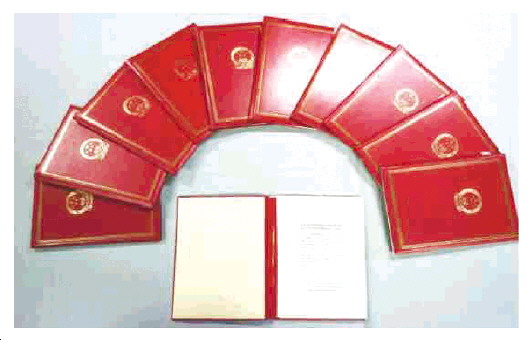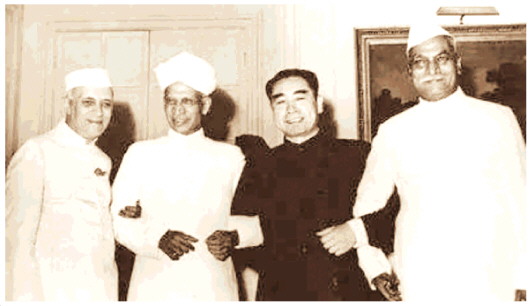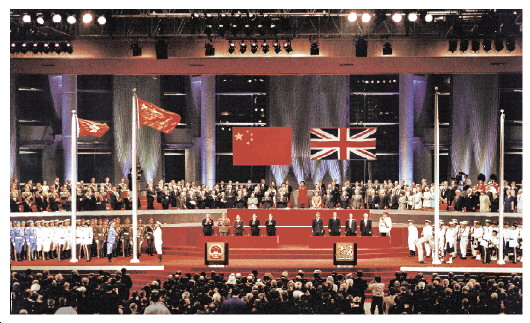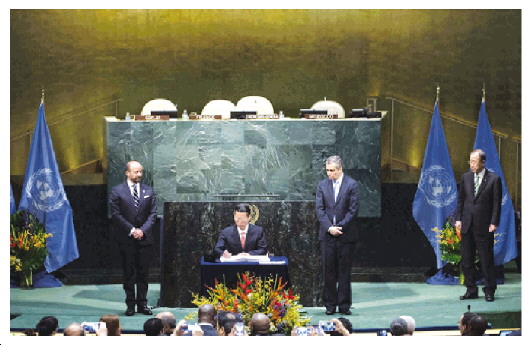Maintain the international order based on international law and promote the construction of a community of human destiny.
More than 27,000 bilateral treaties, more than 500 multilateral treaties, 98% of land border issues have been solved, and 121 extradition and criminal judicial assistance treaties & HELIP; … This set of figures shows People’s Republic of China (PRC)’s great contribution to the construction of international law since its founding 70 years ago. The practice of 70 years shows that China has become an important force to defend international fairness and justice and promote the development of international law, and is an important participant, staunch defender and builder of international law.
"Since the founding of New China 70 years ago, China has not only resumed its legal seat in the United Nations and fully integrated into the international system, but also become an important participant, defender and builder of the international system with the United Nations as the core and international law as the foundation." Recently, Jia Guide, Director of the Treaty and Law Department of the Ministry of Foreign Affairs, said in an exclusive interview with the reporter of Legal Daily.
China has always adhered to the purposes and principles of the Charter of the United Nations, constructively participated in the formulation of international rules in various fields, and has become an important force in safeguarding international fairness and justice and promoting the development of international law.

Some treaties signed by the China government since the founding of New China 70 years ago. Photo courtesy of the Ministry of Foreign Affairs
More than 27,000 bilateral and multilateral treaties have been concluded.
On October 1st, 1949, People’s Republic of China (PRC) was founded.
"After the founding of People’s Republic of China (PRC), one of the first foreign legal affairs to be dealt with is to comprehensively clean up the treaties signed between the old government and foreign countries." Jia Guide said that according to the customary international law on treaty succession, the new government can not inherit the unequal treaties signed by foreign countries with the old government through illegal means such as war and coercion.
In September 1949, the first political consultative conference in China adopted the Common Program, which pointed out: "The Central People’s Government of People’s Republic of China (PRC) should review the treaties and agreements concluded between the Kuomintang government and foreign governments, and recognize them respectively, or abolish them, or modify them, or re-write them according to their contents."
On this basis, New China steadily cleaned up the old treaties, promoted the conclusion of new treaties with foreign countries, and formulated the Treaty Concluding Procedure Law in 1990. Up to now, China has concluded more than 27,000 bilateral treaties and more than 500 multilateral treaties, covering all aspects of international exchanges such as politics, economy, society and culture. A complete treaty system has laid a strong legal foundation for China’s opening up, exchanges and cooperation.

On December 31st, 1953, Premier Zhou Enlai put forward the Five Principles of Peaceful Coexistence for the first time when he met with the Indian government delegation. The picture shows Premier Zhou Enlai taking photos with Indian President Rajendra Prashad (first from right), Vice President sarvepalli radhakrishnan (third from right) and Prime Minister Jawaharlal Nehru (first from left) when he was invited to visit India in late June 1954. Information picture
Advocate and adhere to the Five Principles of Peaceful Coexistence
China has always advocated and adhered to the Five Principles of Peaceful Coexistence and made historic contributions to the development of international law.
In the 1950s, in the decolonization movement after the end of the Second World War, the cause of national independence and liberation in Asia, Africa and Latin America flourished, and newly independent countries were eager to establish equal international relations.
Following the historical trend, New China, together with India and Myanmar, advocated the five principles of mutual respect for sovereignty and territorial integrity, mutual non-aggression, non-interference in each other’s internal affairs, equality and mutual benefit, and peaceful coexistence in 1954. Over the past 60 years, the Five Principles have reflected the universal demands of developing countries for independence, independence, self-improvement and development, and also promoted exchanges and cooperation between countries with different ideologies and social systems.
"The Five Principles are highly consistent with the provisions of the Charter of the United Nations on friendly relations between countries, such as sovereign equality, non-use of force and non-interference in internal affairs. They have become the basic norms guiding state-to-state relations and the basic principles of international law, and have been widely recognized and followed by the international community." Jia Guide emphasized that the Five Principles have also been enshrined in the Constitution of China, as well as in the communiqué s on the establishment of diplomatic relations between China and more than 160 countries and bilateral treaties, which have become the cornerstone of China’s independent foreign policy of peace.

On July 1, 1997, at the handover ceremony, the flag-raising ceremony of China national flag was held. Photo by Wang Miao
The principle of "one country, two systems" enriches the development of international law
China also creatively put forward the policy of "one country, two systems" in order to properly solve the problems of Hong Kong and Macao left over from history.
According to the principle of "one country, two systems", China, Britain and Portugal reached a joint statement through peaceful negotiations, realizing China’s smooth resumption of the exercise of sovereignty over Hong Kong and Macao, which has become a model for peaceful settlement of historical issues between countries.
“‘ One country, two systems ’ Principles and practices have enriched and developed the specific system of international law. " Jia Guide said, for example, there are no ready-made practices and precedents to follow on how to solve the problem of applying and concluding treaties in Hong Kong and Macao Special Administrative Regions and how to implement "one country, two systems" and the Basic Law of the two Special Administrative Regions at the treaty level. In order to ensure the smooth development of foreign exchanges between Hong Kong and Macao Special Administrative Regions, the central government has initiated many new practices in this regard in accordance with the Basic Law. For example, the SAR is given a certain degree of right to conclude foreign treaties, and special arrangements are made for the application of multilateral treaties, taking into account the actual needs of the Hong Kong and Macao SAR, including allowing some treaties that have not yet been joined by the central government and were applied in Hong Kong and Macao before the reunification to continue to apply after the reunification, and some treaties that have been joined in the name of the central government are only applicable to Hong Kong and Macao. All these have enriched and developed international law.
Safeguard the country’s territorial sovereignty and maritime rights and interests
"China has demarcated and demarcated its borders with 12 of its 14 land neighbors in accordance with international law, and solved 98% of the land border problems." Jia Guide said.
On the basis of respecting historical facts and in accordance with international law, China insists on resolving disputes over territorial sovereignty and maritime delimitation through negotiations with the countries directly concerned, and has reached arrangements on maritime delimitation and fishery cooperation through negotiations with Japan, South Korea, Vietnam and other countries, resolutely and forcefully responding to the so-called arbitration against the South China Sea, and opposing any dispute settlement scheme imposed on China and the abuse of arbitration procedures to damage China’s sovereignty and maritime rights and interests.
Jia Guide emphasized that China creatively put forward the idea of "shelving disputes and jointly developing" and signed the Declaration on the Conduct of Parties in the South China Sea with ASEAN countries. At present, the consultation on formulating the Code of Conduct in the South China Sea has entered the fast lane.
Moreover, China has established and improved its domestic marine legislation in accordance with international law. Jia Guide said that shortly after the founding of New China, the China government issued the Declaration on the Territorial Sea, declaring that the width of China’s territorial sea is 12 nautical miles, and all foreign aircraft and military vessels are not allowed to enter China’s territorial sea and the territorial sea without the permission of the China government.
China’s related ideas and practices are not only consistent with the 1958 Convention on Territorial Seas and Adjoining Zones, but also with the development trend of international law at that time, which has played an important role in safeguarding national sovereignty, security and maritime rights and interests. China participated in the negotiation of the United Nations Convention on the Law of the Sea and its related implementation agreements, and formulated modern marine legal systems such as territorial sea and the contiguous zone, fishery law, exclusive economic zone and continental shelf law in accordance with international laws including the Convention.
Building an international judicial law enforcement cooperation network
At present, China has concluded 121 treaties on extradition and criminal judicial assistance with 74 countries, and it can be said that a system of treaties covering major countries in five continents has been initially established.
"Since the 18th National Congress of the Communist Party of China, we have focused on key pursuit targets, key pursuit countries and key contracting countries, built a treaty network, concluded 39 extradition and criminal judicial assistance treaties, and promoted the entry into force of 24 treaties, which is unprecedented in the history of treaty negotiation. Efforts and achievements." Jia Guide said, "We have achieved a breakthrough in the pursuit and recovery of important countries such as the European Union. Extradition treaties with France and Italy have come into effect one after another, and treaties on criminal judicial assistance have been concluded with Britain and Austria."
The China Municipal Government has actively and comprehensively established a legal network for international judicial and law enforcement cooperation, serving and promoting the comprehensive rule of law and the anti-corruption pursuit and recovery work. For example, China actively promotes the conclusion of bilateral extradition treaties and judicial assistance treaties with foreign countries, and participates in multilateral treaties such as the United Nations Convention against Transnational Organized Crime and the United Nations Convention against Corruption, providing legal support for promoting judicial law enforcement cooperation between China and foreign countries and international cooperation against corruption.

On April 22nd, 2016, local time, Zhang Gaoli, Special Envoy of the Supreme Leader of president, China and Deputy Prime Minister of the State Council, attended the high-level signing ceremony of the Paris Agreement at the United Nations Headquarters in new york, and signed the Paris Agreement on behalf of China. Xinhua news agency
Constructive participation in the formulation of global governance rules
"China is widely involved in international treaties and mechanisms related to global governance. It is an important participant and builder of global governance rules and has become a leader in some fields." Jia Guide said.
In the field of climate change, China, together with developing countries, promoted the principle of "common but differentiated responsibilities" to be written into the United Nations Framework Convention on Climate Change, promoted the adoption of the Kyoto Protocol, implemented the common zone principle, and made important contributions to the Paris Agreement.
China adheres to the principle of "common heritage of mankind" and actively participates in international seabed affairs. As early as 1990, COMRA of China applied for registration as one of the pioneer investors. So far, the International Seabed Authority has approved China’s application for five mining areas.
China has successively joined the Antarctic Treaty, the Convention on the Protection of Antarctic Marine Living Resources, the Protocol to the Antarctic Treaty on Environmental Protection and other treaty systems, and carried out Antarctic scientific research, fisheries and other activities in accordance with relevant treaties. As a negotiating country of the Antarctic Treaty and a member of the Antarctic Marine Living Resources Conservation Committee, it has fully participated in Antarctic governance. As an observer of the Arctic Council, China participates in Arctic affairs in accordance with international law and strives to contribute China wisdom and China’s strength to the development of the Arctic.
China has also actively promoted the formulation of rules in new areas of global governance such as the Internet and outer space, providing a legal basis for the orderly development of international cooperation.
□ Reporter’s Notes
"China will firmly uphold the international system with the United Nations as the core and based on international law, and persist in being a staunch defender and builder of international law."
This is the firm voice of Jia Guide, Director of the Treaty and Law Department of the Ministry of Foreign Affairs, after the interview.
In the 70-year historical process, China has always held high the banner of international law, adhered to the international law system centered on the purposes and principles of the Charter of the United Nations, constructively participated in the formulation of international rules in various fields, actively promoted the democratization of international relations, advocated the equal and unified application of international law, and stood up for its words on major international and regional issues, thus becoming the backbone of defending international fairness and justice and promoting the development of international law. As Chairman Supreme Leader pointed out when meeting with UN Secretary-General Guterres in April this year, "China firmly upholds multilateralism, the international system with the UN at the core, the international order based on international law, and promotes the building of a community of human destiny".
China embodies the following distinctive features in the practice of international law: First, it emphasizes respect for national sovereignty, upholds the sovereign equality of all countries, and opposes interfering in other countries’ internal affairs and infringing on their sovereignty under any pretext.
Second, we want peace instead of war, adhere to mutual non-aggression, oppose the frequent use or threat of force, advocate peaceful settlement of international disputes, and respect the right to freely choose dispute settlement methods.
Third, adhere to fairness and justice, advocate the equal and uniform application of international law, do not engage in double standards, and oppose "using it together, but abandoning it if it is not".
The fourth is to defend multilateralism, oppose unilateralism and bullying, and achieve mutual benefit and common development through international cooperation on the basis of equality.
At present, the international situation continues to fluctuate and the uncertainty is more prominent. In particular, individual countries pursue unilateralism and protectionism, violate international obligations, weaken multilateral mechanisms, engage in bullying and interference, impose unilateral sanctions indiscriminately, provoke trade wars and scientific and technological wars everywhere, and ignore the basic norms of international law and international relations, which has brought uneasiness, conflict and turmoil to the world.
Faced with this situation, on the one hand, China clearly adheres to multilateralism and firmly upholds the international system with the United Nations as the core and based on international law; on the other hand, it strengthens cooperation with other countries on the basis of the above principles, and works together to build a community of human destiny and build a new type of international relations.
The Chairman of the Supreme Leader has put forward an important initiative to build a community of human destiny on a series of international occasions. This concept has been written into the Constitution of China, which represents China’s solemn commitment to firmly follow the path of peaceful development and firmly safeguard international law.
Reporter Wang Yanyan